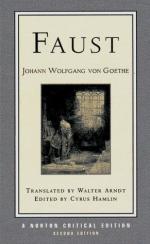I am satisfied that the difference between a translation of Faust in prose or metre is chiefly one of labor,—and of that labor which is successful in proportion as it is joyously performed. My own task has been cheered by the discovery, that the more closely I reproduced the language of the original, the more of its rhythmical character was transferred at the same time. If, now and then, there was an inevitable alternative of meaning or music, I gave the preference to the former. By the term “original metres” I do not mean a rigid, unyielding adherence to every foot, line, and rhyme of the German original, although this has very nearly been accomplished. Since the greater part of the work is written in an irregular measure, the lines varying from three to six feet, and the rhymes arranged according to the author’s will, I do not consider that an occasional change in the number of feet, or order of rhyme, is any violation of the metrical plan. The single slight liberty I have taken with the lyrical passages is in Margaret’s song,—“The King of Thule,”—in which, by omitting the alternate feminine rhymes, yet retaining the metre, I was enabled to make the translation strictly literal. If, in two or three instances, I have left a line unrhymed, I have balanced the omission by giving rhymes to other lines which stand unrhymed in the original text. For the same reason, I make no apology for the imperfect rhymes, which are frequently a translation as well as a necessity. With all its supreme qualities, Faust is far from being a technically perfect work.[K]
[K] “At present, everything runs in technical grooves, and the critical gentlemen begin to wrangle whether in a rhyme an s should correspond with an s and not with sz. If I were young and reckless enough, I would purposely offend all such technical caprices: I would use alliteration, assonance, false rhyme, just according to my own will or convenience—but, at the same time, I would attend to the main thing, and endeavor to say so many good things that every one would be attracted to read and remember them.”—Goethe, in 1831.
The feminine and dactylic rhymes, which have been for the most part omitted by all metrical translators except Mr. Brooks, are indispensable. The characteristic tone of many passages would be nearly lost, without them. They give spirit and grace to the dialogue, point to the aphoristic portions (especially in the Second Part), and an ever-changing music to the lyrical passages. The English language, though not so rich as the German in such rhymes, is less deficient than is generally supposed. The difficulty to be overcome is one of construction rather than of the vocabulary. The present participle can only be used to a limited extent, on account of its weak termination, and the want of an accusative form to the noun also restricts the arrangement of words in English verse. I cannot hope to have been always successful; but I have at least labored long and patiently, bearing constantly in mind not only the meaning of the original and the mechanical structure of the lines, but also that subtile and haunting music which seems to govern rhythm instead of being governed by it.




